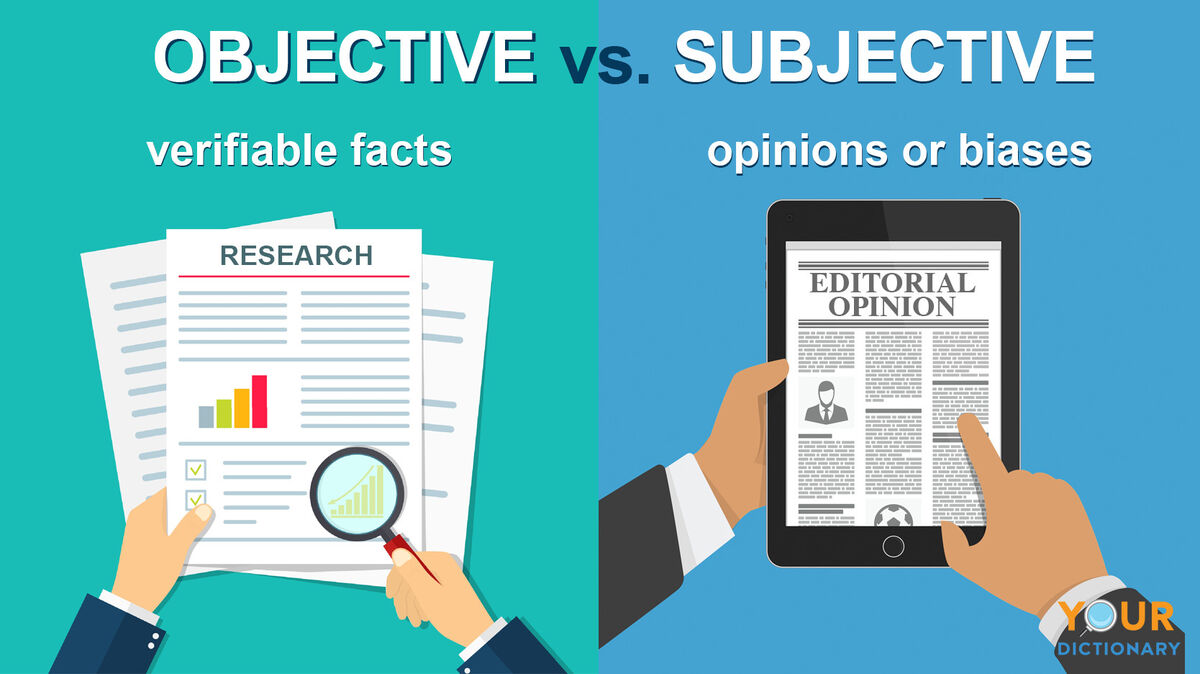
When evaluating information, it's very important to be able to separate fact from opinion.
Objective information is based on unbiased facts, whereas subjective information is based on opinion and conjecture.
Both types are valuable, as long as the difference between objective and subjective information is clear.
"Objective" vs. "Subjective": Key Differences
The words subjective and objective only differ by a few letters, but they are not close in meaning.
The terms can both be used to describe information, but that is where their similarity ends.
- objective - When a person is being objective, that individual is considering a situation or basing decisions solely on verifiable facts.
- subjective - When a person is being subjective, the individual is influenced by their own thoughts, opinions, or biases related to a situation.
How To Use "Objective" and "Subjective" in a Sentence
To get a better idea of subjective vs. objective, review a few sentence examples that use the terms correctly.
- It's easier for teachers to grade objective multiple-choice and true/false questions than to score subjective essay questions.
- It is very difficult to avoid letting subjective factors like effort and sincerity influence student grades in public speaking class.
- Taste is very subjective, so the fact that I like onions doesn't mean that you will also like them.
- Journal writing is very subjective, but it is a valuable educational undertaking for middle-school and high-school students.
- Objectively, I know I should buy the less-expensive practical car, but my heart really is set on the flashy sports car.
- Managers shouldn't investigate their own employees because it's too difficult to be objective with people you know very well.
- If your own child is competing, you cannot serve as a judge because it would be difficult to evaluate all entries in an objective matter.
Objective vs. Subjective Data Examples
Objective data considers only what can be directly observed, counted, or otherwise measured.
Subjective data takes into account perceptions, feelings, and reactions.
For example:
- A survey question that asks respondents to report who they plan to vote for in a particular election provides an objective measure of how many (or what percent of) respondents plan to vote for each candidate.
- A follow-up question on the same survey that asks respondents to explain why they support some candidates and why they don't support others provides subjective information about voter motivation.
Objective vs. Subjective Observation Examples
Observational research can be objective or subjective. The determining factor is based on exactly what is being measured.
For example:
- If a researcher is seeking to measure the number of times speakers say "um," "uh," "like," or "erm" in certain presentations, that person is conducting objective observational research.
- The guidelines are so clearcut that anyone who listens to the same communication events will get the same results.
- If a researcher is doing a content analysis to determine how often women are portrayed negatively in primetime TV shows, the individual is conducting subjective observational research.
- That person's opinion about what constitutes negative treatment will impact which circumstances get counted as a negative portrayal.
Examples of Objective and Subjective Test Questions
Tests can have objective or subjective questions or a combination of the two. Objective test questions have specific correct and incorrect answers that are a matter of fact.
For example:
- A question that asks students to state or identify which part of speech a person, place, or thing is would be an example of an objective question.
- The answer is noun. This is a fact rather than a matter of opinion.
- The answer will either be correct or incorrect.
- A test question that asks students to list and describe their favorite holiday and include a statement about why they like it is a subjective question.
- The response will be the student's opinion rather than a verifiable fact.
- This does not test knowledge of holidays, but rather provides a way to evaluate writing skills.
Is "Morality" Objective or Subjective?
The question of whether morality is objective or subjective is an interesting philosophical and psychological question. While not everyone agrees to the specific behaviors or actions that determine who is moral, there is an objective element to morality.
For example, actions that deliberately cause harm to another person are generally considered to be immoral from an objective perspective.
However, dealing with ethical dilemmas requires subjective decision making.
To learn more on this topic, explore the difference between ethics, morals, and values. Then, consider what you learn in the context of social justice issues.